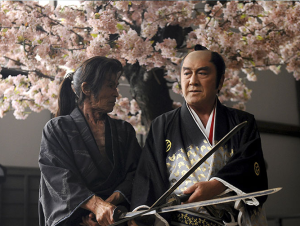
The Japanese film festival CineMatsuri brings a variety of cinematographic arts to D.C., providing a unique aspect of the country’s culture amidst the Cherry Blossom Festival.
As spring slowly arrives in Washington and winter coats are put to rest, it’s easy to get lost in all the excitement of the coming season. Springtime, for many in our area, means one thing: Japanese cherry blossoms. But beyond the beautifully colored petals and the Sakura Matsuri street festival, there is another event that Hoyas should be aware of.
CineMatsuri Japanese Film Festival will run from March 22 to March 26 at the E Street Cinema. For the past two years, the Japan-America Society of Washington, D.C., has orchestrated a premier of five of Japan’s top movies, using films that are guaranteed crowd pleasers.
“The movies we show have to be something we can all relate to,” said John Malott, a former ambassador to Malaysia during the Clinton administration who is now the President and CEO of the Japan-America Society. “They have to be movies that people would enjoy seeing and they have to be fun to watch.”
Be warned — if you are a serious Japanese cinema buff, this may not be the right event for you. The films chosen for this festival are aimed at drawing in a diverse crowd, and it has succeeded in this regard. Last year, 75 percent of the attendees of CineMatsuri were not Japanese at all. And, for many of the attendees, it was their first experience seeing a Japanese film.
This year, the five selected films span genres, themes and time periods. The films, “Uzumasa Limelight,” “Our Family,” “Our Homeland,” “The Snow White Murder Case” and “The Little House” each bring differing perspectives to the table.
In “Uzumasa Limelight,” director Ken Ochiai channels the classic Japanese cinema obsession with the samurai persona, telling the story of a movie extra who is killed on screen time and time again, never coming into a spotlight of his own.
Another film that seems particularly interesting is Yonghi Yang’s “Our Homeland,” which tells the filmmaker’s story of strife and hardship as a North Korean immigrant. In the film, a brother and sister of North Korean descent are separated as one makes the ill-fated choice to return to their Korean homeland. Through an emotional journey, the film balances political strife with family drama that seems to channel the immigration debate facing America today.
While Japanese film was in decline through much of the later 20th century, it has made a strong resurgence in the past 10 years. This has led to a proliferation of Japanese films, making the job of the Japan-America Society much more challenging when selecting which pictures to display for the public.
The committee of six wants to make sure that each movie gets a fair chance to be selected. “We don’t want to influence each other’s opinions,” former Ambassador Malott explained. “For one of the films we couldn’t get the royalties so we all got together and watched it at my house. Even then we didn’t tell anyone our opinion.”
However, it is their job to make sure every film selected adheres to the Japan-America Society’s strict criteria. It states that a film must be well reviewed by Japanese film critics or an international film festival; they must also be “uncontroversial” so they can be enjoyed by all audiences. Finally, and most importantly, the films must be able to “translate well.” The films have to be enjoyable for a broad audience interested in Japanese culture. So, if a film is too caught up in the intricacies of Japanese history, which might make it too complex to be easily enjoyed by those unfamiliar with the culture, it will most likely be scrapped.
Overall, the goal of CineMatsuri is to spread culture and build friendship. Through putting together a wide range of easily understood Japanese films, the Japan-America Society hopes to create a unique experience that D.C. citizens will truly enjoy.
This year, CineMatsuri’s team is making a more noticeable effort to reach out to college students in particular, hoping to engender the sense of friendship that the United States has enjoyed with Japan for the past 70 years. CineMatsuri offers an easy-to-understand introduction to Japanese culture, and it will be a phenomenal way to kick off cherry blossom season. Tickets ($13) can be purchased online at www.cinematsuri.org.



















